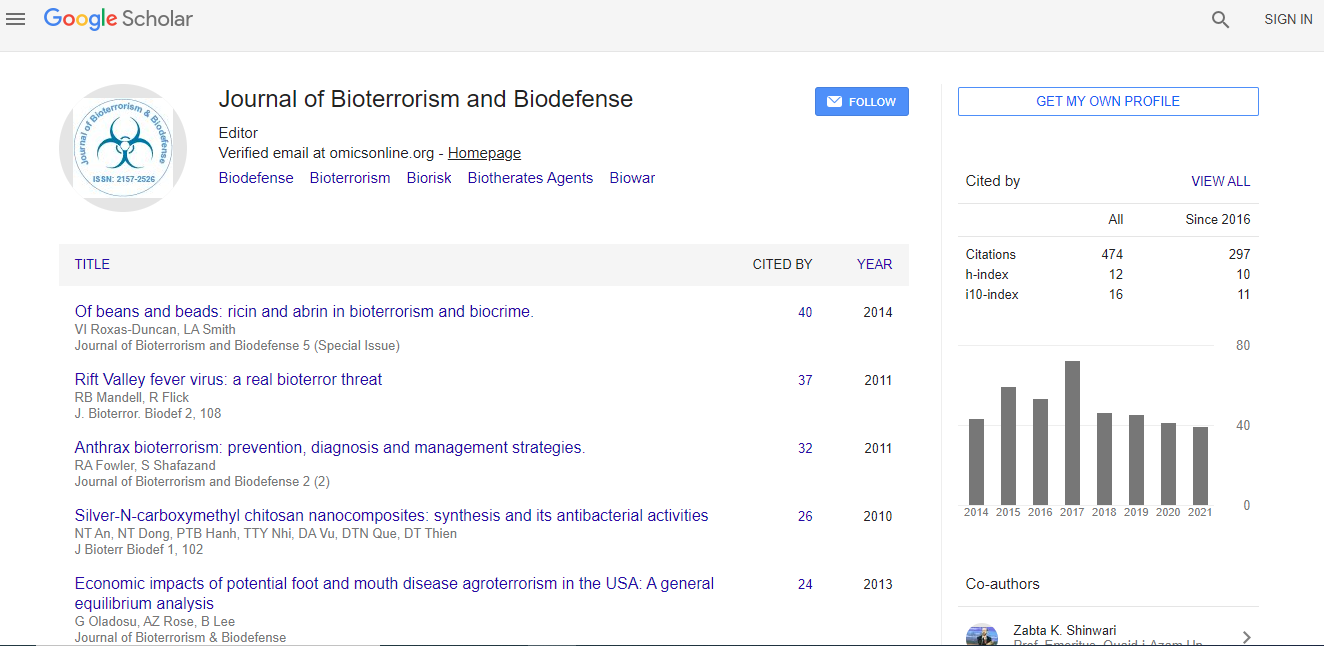Research Article
Exploitation of Glycobiology in Anti-Adhesion Approaches against Biothreat Agents
Marta Utratna1, Shane Deegan1 and Lokesh Joshi,12*
1Aquila Bioscience Limited, Business Innovation Centre, National University of Ireland Galway, Galway, Ireland
2Glycoscience Group, National Centre for Biomedical Engineering Science, National University of Ireland Galway, Galway, Ireland
- *Corresponding Author:
- Prof. Lokesh Joshi
Aquila Bioscience Limited
Business Innovation Centre
National University of Ireland Galway
Galway, Ireland
Tel: +35391495768
E-mail: Lokesh.Joshi@nuigalway.ie
Received Date: July 27, 2016; Accepted Date: September 01, 2016; Published Date: September 07, 2016
Citation: Utratna M, Deegan S, Joshi L (2016) Exploitation of Glycobiology in Anti-Adhesion Approaches against Biothreat Agents. J Bioterror Biodef 7:150. doi:10.4172/2157-2526.1000150
Copyright: © 2016 Utratna M, et al. This is an open-access article distributed under the terms of the Creative Commons Attribution License, which permits unrestricted use, distribution, and reproduction in any medium, provided the original author and source are credited.
Abstract
Pathogen adherence to a host cell is one of the first essential steps for establishing invasion, colonization and release of virulence factors such as toxins. Understanding the mechanisms used by pathogens and toxins to adhere and invade human cells could lead to the development of new strategies for preventing and controlling the spread of infectious diseases. This review focuses on carbohydrate-lectin interactions utilized by selected biothreat agents to bind and invade host cells. The principle of using anti-adhesion molecules, based on glycobiology research, has already been shown to be effective in the treatment of influenza. Therefore, translating the same principle to other biothreat agents that mediate invasion of a host cell through carbohydrate-lectin mechanisms is a very promising strategy. We investigate recent literature to highlight the latest developments in the field of glycobiology focused on inhibiting the initial steps of pathogen invasion, with examples for bacteria, toxin and virus interactions. The successful glycomimetics and glycoconjugates represent strategies for interruption of adhesion by single molecules and in multivalent systems against uropathogenic E. coli, several toxins (Shiga-like, cholera, botulinum) and well-known or emerging viruses (influenza, HIV, Ebola, and Zika). This review provides promising directions and prophylactic as well as therapeutic potential of anti-adhesive strategies against selected biothreat targets.

 Spanish
Spanish  Chinese
Chinese  Russian
Russian  German
German  French
French  Japanese
Japanese  Portuguese
Portuguese  Hindi
Hindi 